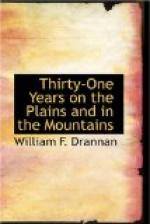Finally Mr. Carson—whom I had now learned to address as Uncle Kit—said to me, one morning, that as my gun was about completed we would make preparations to start West. So we went out to a farm, about two miles from St. Louis, to get the horses from where Uncle Kit had left them to be cared for during the winter.
We went on foot, taking a rope, or riatta, as it is called by frontiersmen, and on the way to the farm I could think or talk of nothing but my new rifle, and the buffalo, deer, antelope and other game that I would kill when I reached the plains. Uncle Kit remarked that he had forgotten to get me a saddle, but that we would not have to wait to get one made, as there were plenty of saddles that would fit me already made, and that he would buy me one when he got back to town.
When we reached the farm where the horses were, Uncle Kit pointed out a little bay pony that had both his ears cropped off at the tips, and he said:
“Now Willie, there is your pony. Catch him and climb on,” at the same time handing me the riatta.
The pony being gentle I caught and mounted him at once, and by the time we had got back to town money could not have bought that little crop-eared horse from me. As will be seen, later on, I kept that pony and he was a faithful friend and servant until his tragic death, years afterward.
In two days we had a pack-train of twenty horses rigged for the trip. The cargo was mostly tobacco, blankets and beads, which Carson was taking out to trade to the Indians for robes and furs. Of course all this was novel to me as I had never seen a pack-saddle or anything associated with one.
A man named Hughes, of whom you will see much in this narrative, accompanied and assisted Uncle Kit on this trip, as he had done the season before, for besides his experience as a packer, he was a good trapper, and Uncle Kit employed him.
CHAPTER II.
Beginning of an adventurous life.—First wild turkey.—First buffalo.—First feast as an honored guest of Indians.—Dog meat.
It was on the morning of May 3, 1847, that we rounded up the horses and Uncle Kit and Mr. Hughes began packing them.
It being the first trip of the season some of the pack-ponies were a little frisky and would try to lie down when the packs were put on them. So it became my business to look after them and keep them on their feet until all were packed.
Everything being in readiness, I shook hands, good-bye, with my much-esteemed friend, Henry Becket, who had been helping me with the pack-horses, and who also coveted my crop-eared pony, very naturally for a boy. Then we were off for a country unknown to me, except for what Uncle Kit had told me of it.
My happiness seemed to increase, if that were possible. I was unspeakably glad to get away from St. Louis before Mr. Drake had learned of my whereabouts, and up to the time of this writing I have never been back to St. Louis, or Tennessee, nor have I heard anything of Mr. Drake or my ancient enemy, the angel of Erebus.




